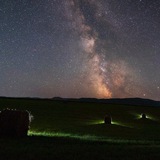
Telegram-канал cosmosx - Космос 🔭
 440
440
Новости, фотографии, статьи о космосе. #Книги #Статьи #Новости Научные журналы: @scientificmagazine

 440
440
Новости, фотографии, статьи о космосе. #Книги #Статьи #Новости Научные журналы: @scientificmagazine

Apollo 11: Catching Some Sun
2017-07-22
Bright sunlight glints and long dark shadows mark this image of the lunar surface. It was taken July 20, 1969 by Apollo 11 astronaut Neil Armstrong, the first to walk on the Moon. Pictured is the mission's lunar module, the Eagle, and spacesuited lunar module pilot Buzz Aldrin unfurling a long sheet of foil also known as the Solar Wind Composition Experiment. Exposed facing the Sun, the foil trapped particles streaming outward in the solar wind, catching a sample of material from the Sun itself. Along with moon rocks and lunar soil samples, the solar wind collector was returned for analysis in earthbound laboratories.
Full Source

The Tarantula Nebula
2017-11-16
Explanation | Full Source

Messier 10 and Comet
Copyright: German Penelas Perez
Explanation | Full Source

Pleiades over Half Dome
Copyright: Dheera Venkatraman
Explanation | Full Source

Swiss Alps, Martian Sky
2021-02-18
Explanation | Full Source

Mercury from Passing BepiColombo
Explanation | Full Source

Milky Way Galaxy Doomed: Collision with Andromeda Pending
Explanation | Full Source

Астрономия. Популярные лекции
Автор: Владимир Сурдин
В книге представлены развернутые и отредактированные записи некоторых лекций, прочитанных в последние годы студентам различных специальностей. Базой для них стал межфакультетский курс МГУ «Основы астрономии». Эти лекции можно использовать как вводный курс для студентов естественно-научных факультетов (физиков, химиков, биологов, географов и геологов), а также математиков и инженеров, которые ранее систематически не изучали астрономию, но в своей работе могут с ней соприкоснуться. Лекции будут небесполезны и для филологов, особенно для переводчиков и редакторов, поскольку знакомят с современной астрономической терминологией и важнейшими понятиями из области космических наук.
Скачать: PDF | fb2
#книги

Milky Way over French Alp Hoodoos
Copyright: Benjamin Barakat
Explanation | Full Source

Saturn in Infrared from Cassini
Explanation | Full Source

Jupiter and Ring in Infrared from Webb
Explanation | Full Source

Stephan's Quintet from Webb, Hubble, and Subaru
Explanation | Full Source

Europa and Jupiter from Voyager 1
Explanation | Full Source

Every day a new image or photo of our enchanting universe is published from NASA's public api.
/channel/nasa_channel_bot

The NGC 6914 Complex
Copyright: Giorgio Ferrari
Explanation | Full Source

Filaprom on the Western Limb
Copyright: Martin Wise
Explanation | Full Source

A Deep Sky Behind an Eclipsed Moon
Copyright: Andrei Ionut Dascalu
Explanation | Full Source

NGC 1316: After Galaxies Collide
Copyright: Capture: Greg Turgeon Processing: Kiko Fairbairn
Explanation | Full Source

Новый канал Astronomy Picture of the Day на котором каждый день публикуется фото дня от NASA. Посты выходят через нашего бота @nasabotphoto_bot.
На данный момент он находится в разработке. Помимо фото дня вы можете смотреть случайные фотографии из Марса.
Пожелания или ошибки вы можете присылать сюда @nasa_help_bot

NGC 3572 and the Southern Tadpoles
Full photo
This cosmic skyscape features glowing gas and dark dust clouds along side the young stars of NGC 3572. A beautiful emission nebula and star cluster it sails far southern skies within the nautical constellation Carina. Stars from NGC 3572 are toward top center in the telescopic frame that would measure about 100 light-years across at the cluster's estimated distance of 9,000 light-years. The visible interstellar gas and dust is part of the star cluster's natal molecular cloud. Dense streamers of material within the nebula, eroded by stellar winds and radiation, clearly trail away from the energetic young stars. They are likely sites of ongoing star formation with shapes reminiscent of the Tadpoles of IC 410 better known to northern skygazers. In the coming tens to hundreds of millions of years, gas and stars in the cluster will be dispersed though, by gravitational tides and by violent supernova explosions that end the short lives of the massive cluster stars.